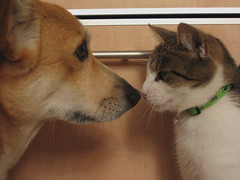Do you really know yourself? That question always has intrigued me, and as an INFJ, it's only natural that I would spend a lot of time and thought figuring out who I am, what motivates me, and what my passions are.
For those of you who aren't INFJ's or who haven't explored character and temperament types, an INFJ is just one of sixteen personality types commonly associated with the model of personality development created by Isabel Briggs Myers, the author of the world's most widely used personality inventory, the MBTI or Myers-Briggs Type Indicator. ® Myers and her mother, Katharine Briggs, developed their model and inventory around the ideas and theories of psychologist Carl Jung.
There are four pairs of preferences in typing:
-extroversion (E) or introversion (I);
-sensation (S) or intuition (N);
-thinking (T) or feeling (F)
-perceiving (P) or judging (J).
We all have elements of each of these functions, but we differ in the degree of preference we have for choosing one way of doing or being over another. Thus, the sixteen combinations.
So, why does this matter? For me, it is simply fascinating. I love learning about myself and other people. But typing has a much more profound and practical application. People are different and have different motives, values, drives, etc. They perceive and believe differently. And in spite of knowing about these variations in behavior, most people see others' differences as some manifestation of being bad, stupid, or crazy. We naturally tend to see people's differences as a kind of character flaw in them. But if you understood them, what makes them tick and how they experience the world, imagine the positive implications for your personal and professional relationships!
As an INFJ, I love to focus on possibilities and interact with people individually or in small groups. Put me in a solo job where I have to follow detailed instructions or assemble something, and I'm bound to start chewing my ankle off. Employers utilize type testing all the time to help them figure out where people belong within an organization and how to take advantage of their natural abilities and preferences.
But I think on a personal level, understanding your own type and the types of those close to you could put us on the road to world peace! Perhaps that's stretching it, but you get my drift. If you understood that your friend isn't being "too sensitive" when her feelings get hurt, but that emotional sensitivity is part of her natural make-up, then you learn to engage with her in a different way.
I love this quote from Please Understand Me, Character & Temperament Types, by David Keisey and Marilyn Bates:
"If I do not want what you want, please try not to tell me that my want is wrong.
Or if I believe other than you, at least pause before you correct my view.
Or if my emotion is less than yours, or more, given the same circumstances, try not to ask me to feel more strongly or weakly.
Or yet if I act, or fail to act, in the manner of your design for action, let me be.
I do not, for the moment at least, ask you to understand me. That will come only when you are willing to give up changing me into a copy of you."
If you are intersted in taking the Myers-Briggs personality sorter, contact a coach or psychologist trained in administering the test. You can take a shorter version online at:
http://www.humanmetrics.com/cgi-win/JTypes2.asp.
Tuesday, September 22, 2009
Getting To Know You
Subscribe to:
Post Comments (Atom)


This is the most awesome blog ever! I think the quote from Keisey was written just for me. It's going up in my house.
ReplyDeleteI took that test: INFJ. Surprised? What does that mean? How do I figure out what I should do with my life?!
ReplyDeleteNo way I just noticed you are INFJ too! No wonder we could talk for days!
ReplyDeleteBut I'm not romantic at all, which I should be according to one of the links. Hmmm. I'm a freak.
ReplyDelete